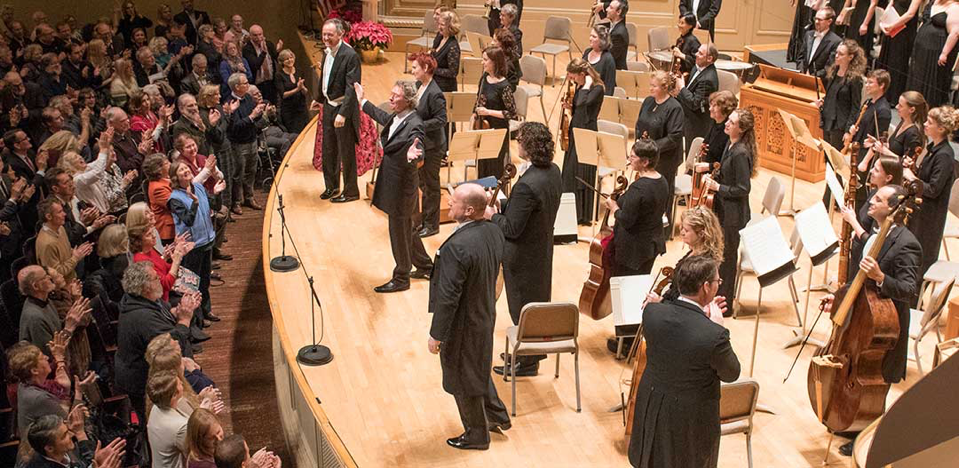The New Sound-World of Old Music

Courtesy of Handel + Haydn
Listen
“Make the music live again.” Harry Christophers, the artistic director of the Handel + Haydn Society, strives to present the music of Baroque and Classical era composers in our modern era. The Handel + Haydn Society is a period-instrument orchestra and chorus founded in Boston in 1815 and is the oldest continually performing arts organization in the US. Harry Christophers is now in his 9th season as artistic director. We talked to Mr. Christophers about his “new” approach to “old” music. We also asked him about the differences between the US and the UK in terms of classical music and about the upcoming 2018-19 season of his ensemble. Listen to the entire interview above or read ahead for a preview!
Pao: You’ve worked with orchestras which use both period instruments and modern instruments. Have you noticed any differences?
Christophers: Modern orchestras are scared stiff of Haydn because he’s difficult. And that’s not the fault of the modern orchestra, it’s the fact that they have to play repertoire of Mozart right through to Copland, Britten, Adams, Boulez, etc. so they’re having to survey a large number of styles and many eras of music. The beauty of performing on period instruments is that we’re concentrating very much on the progression, really, from the Baroque era to the Classical era. So we’re seeing the stylistic elements grow, and we’re seeing the way these instruments took shape. So instantly we’ve got a different sound world. We’re creating a sound world that Haydn was used to. And that in its own way makes the music incredibly refreshing.
The bigger symphony orchestra today, they use quite a lot of vibrato, the tone is very very warm and lush, and that’s not to say on period instruments that you can’t achieve that. But on period instruments, we play much more in a pure-toned way so we’re hearing the harmonic content really clearly. Also, the incisiveness with which the strings play is electric. So, as I said, it’s that amazing sound world of the period instruments that really transforms the music of Haydn.
Pao: With this historical approach, have you found it that it’s sometimes difficult to determine what the composer truly wants, and if so, do you ever have to make some inferences?
Christophers: Well, yes you do. Haydn littered his score. He was almost over-methodical in putting staccato notes and putting wedges on notes all over the place. It’s quite amazing. If you take all those terms very literally, they’re all going to come out the same. But when you take a sforzando, for instance, which is a kind of accent, it has a different gesture and a different movement, so we need to make sure we adopt the mood of the symphony and we put all his markings in relation to that. I think that’s what makes it really exciting to perform, and that’s why you’ll hear different period orchestras having different interpretations of those elements.
…If you look in any encyclopedia, the first sentence will say, “Haydn is the grandfather of the symphony.” That’s a bit like saying we play on old instruments. Now that makes it sound all antique. But actually, it’s not. The instruments are fresh, they’re alive. Haydn was full of wit, drama, emotion. You take any minuet and trio, for instance, and they’re just so refreshing. He wrote hundreds of them, so he was always having to be inventive…
Pao: I’ve learned that you’ve also had the opportunity to work and study extensively in the UK. Have you noticed working on these two continents any differences in approach to baroque music, to historically informed musical performance, or to classical music in general?
Christophers: I think here in the United States, the world of period music sort of had a late start. I just take our own ensemble, Handel + Haydn Society, as an example. When it was turned into a period instrument orchestra, that was done in the 1980s by Chris Hogwood…
It’s a revolution in how people listen to period music. Everybody who comes to our concerts here find it so refreshing, so rewarding, everything sounds new, it sounds exciting.
You can hear the Handel + Haydn Society perform Purcell’s The Fairy-Queen on April 6th at 7pm or on April 8th at 3pm in Jordan Hall. For tickets and more information, you can visit their website: https://handelandhaydn.org/
Allison Pao is a radio host for WHRB Classical. You can hear her feature “The Language of Music” which explores the intersection of music and literature on Fridays, 6-7pm. This interview was produced with the help of Studio Engineer Emily Spector.